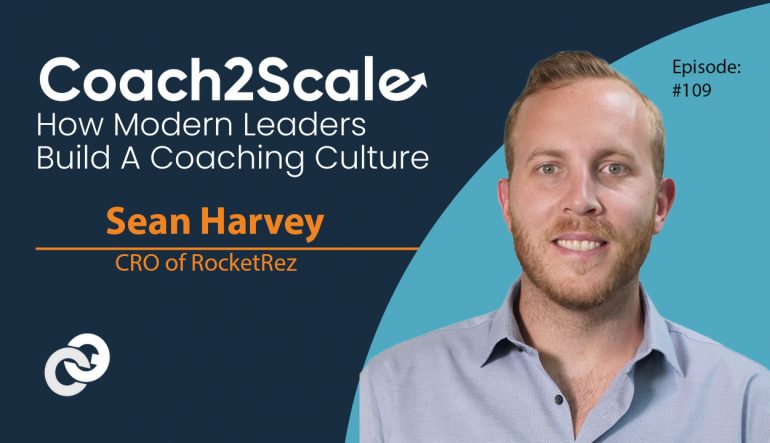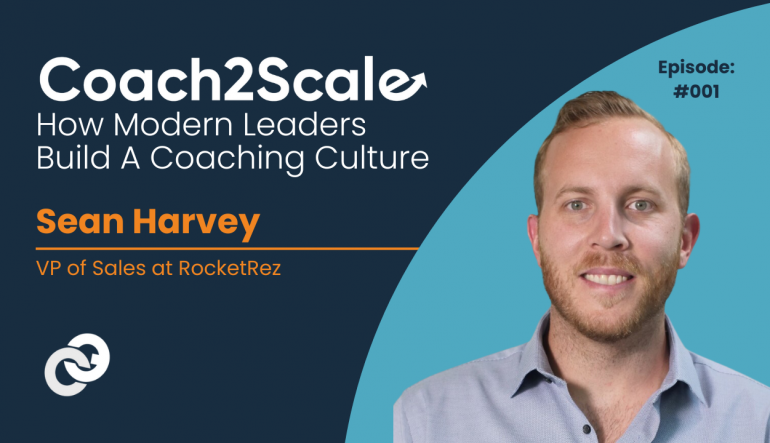In this episode, Sean Harvey, CRO at RocketRez, shares a practical framework for building coaching cultures that actually stick. He explains why trust, not tactics, is the starting point for real performance, and how coaching must move beyond pipeline reviews and into intentional skill development. From his early Oracle training to leading teams through hypergrowth and private equity scale-ups, Sean outlines the lessons that shaped his belief in coaching as both a performance lever and a retention strategy.
If you’re still coaching “on the fly” or stuck playing super-rep, this conversation will challenge your assumptions. Sean covers the link between psychological safety and rep engagement, how vulnerability-based trust unlocks real development, and why sustainable growth demands coaching at every level from C-suite to the frontlines. You’ll walk away with a clearer understanding of what coaching is, what it’s not, and how to build a team that stays, grows, and performs.
Sean Harvey, CRO at RocketRez, joined us for this week’s Coach2Scale episode. The conversation wasn’t about pipeline mechanics, outbound scripts, or tech stacks. It was about something much harder to operationalize and far more important: coaching, trust, and how the best sales orgs actually scale.
If you’re a CRO trying to improve team performance, you’re probably wrestling with some version of the same question Sean has been answering for years:
How do you build a team that performs without burning out your managers or churning your best reps?
Here’s what Sean taught us, backed by firsthand experience, not theory.
1. Coaching Must Cascade from the C-Suite
One of Sean’s first lessons: if coaching isn’t modeled by senior leadership, it won’t survive pressure.
This isn’t a “nice to have” or a cultural initiative to hand off to Enablement. Coaching has to be operationalized the same way forecasting and pipeline reviews are. “When leaders stop prioritizing it, it vanishes,” Sean said. And when it vanishes, so does predictability.
The leaders who do this well embed coaching into the company’s DNA, not just the manager’s calendar.
2. Trust Is the Prerequisite for Performance
It’s easy to talk about building a coaching culture. It’s harder to build the trust that makes coaching possible.
Sean uses the term “vulnerability-based trust,” a phrase pulled from experience, not a TED Talk. Reps need to feel safe enough to get uncomfortable. That means being okay with failure in front of their peers. It means raising their hand to role-play and knowing their manager won’t judge them for messing up.
“I don’t need them to believe my way is the only way,” Sean said. “I need them to trust I’m in it to help them grow for this deal, and the next one.”
This kind of trust doesn’t just improve performance. It slows regrettable attrition. It gives you rep engagement and better coaching outcomes.
3. Stop Saving Deals. Start Developing People.
This one landed hard.
Sean shared a story about intentionally taking a deal off the table in front of a rep during a call, solely to make a coaching point. “The rep was panicked. But the deal closed right after,” he laughed. Why? Because when you coach from a place of strength, not desperation, people respond.
But this was the bigger takeaway: Your job as a leader isn’t to save the deal. It’s to build the rep who can win the next ten.
You can’t build a predictable revenue engine if every quarter depends on heroics. You need managers who aren’t just super-reps. You need developers of talent.
4. Consistency Is More Important Than Intensity
You can run a great SKO. Bring in a methodology. Launch a new onboarding track. All of that matters.
But what moves performance isn’t bursts of inspiration. It’s lightweight, high-frequency coaching. Sean discussed role plays, team debriefs, and weekly breakdowns of what went wrong in a lost deal, emphasizing the importance of everything happening in rhythm.
That rhythm matters more than any one session. And it has to be baked into the management operating cadence, not left to chance.
5. Scalability ≠ Headcount. It = Productivity per Rep
This was one of the most important mindset shifts Sean unpacked.
“Hiring 30 reps doesn’t mean you scaled. It means you spent,” he said.
Sean challenged the way most venture-backed orgs think about scale. His argument was simple: if your only lever is headcount, your margin gets worse, your ramp gets longer, and you create more performance variance, not less.
Real scale comes from improving productivity per rep. You don’t need 30 reps to do $30M. You need 15 reps who perform like 30. And that only happens with structured, intentional, data-driven coaching.
6. Managers Are Drowning, And We’re Still Asking for More
This one hits home for any CRO reading this. Your first-line managers are often your most overloaded, undertrained, and under-supported leaders.
They’re juggling deals, dashboards, check-ins, and team meetings. Most were promoted because they were top reps, not because they knew how to develop people. And we expect them to coach?
If we don’t equip managers with coaching tools and give them time in the operating model to use them, we’re setting them up to fail. And when they fail, you lose reps, productivity, and momentum. CoachEm exists to solve exactly this.
7. If You Want to Keep Reps, You Have to Grow Them
Coaching isn’t just about performance. It’s about retention.
Top reps don’t leave because of comp alone. They leave when they stop feeling developed. Sean made it clear: reps want to be challenged, supported, and grown. If they don’t get that from you, they’ll go find it somewhere else.
The best leaders invest in their people so well that they could leave but make the experience so rich, they don’t want to.
Final Thought
Sean’s message to CROs is clear:
If you want predictable revenue, you need consistent coaching.
If you want consistent coaching, you need trust.
If you want trust, you need to lead differently.
The deal might get you through the quarter. But the coach gets you through the year.
🎧 Listen to the full conversation with Sean Harvey on Coach2Scale: How Modern Leaders Build Coaching Cultures.
Available wherever you get your podcasts.
Or watch it on YouTube.





